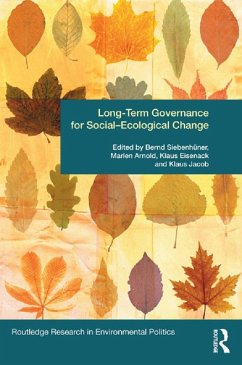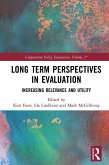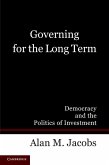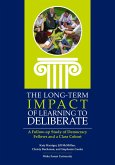Long-Term Governance for Social-Ecological Change (eBook, ePUB)
Redaktion: Siebenhüner, Bernd; Jacob, Klaus H.; Eisenack, Klaus; Arnold, Marlen
34,95 €
34,95 €
inkl. MwSt.
Sofort per Download lieferbar

17 °P sammeln
34,95 €
Als Download kaufen

34,95 €
inkl. MwSt.
Sofort per Download lieferbar

17 °P sammeln
Jetzt verschenken
Alle Infos zum eBook verschenken
34,95 €
inkl. MwSt.
Sofort per Download lieferbar
Alle Infos zum eBook verschenken

17 °P sammeln
Long-Term Governance for Social-Ecological Change (eBook, ePUB)
Redaktion: Siebenhüner, Bernd; Jacob, Klaus H.; Eisenack, Klaus; Arnold, Marlen
- Format: ePub
- Merkliste
- Auf die Merkliste
- Bewerten Bewerten
- Teilen
- Produkt teilen
- Produkterinnerung
- Produkterinnerung

Bitte loggen Sie sich zunächst in Ihr Kundenkonto ein oder registrieren Sie sich bei
bücher.de, um das eBook-Abo tolino select nutzen zu können.
Hier können Sie sich einloggen
Hier können Sie sich einloggen
Sie sind bereits eingeloggt. Klicken Sie auf 2. tolino select Abo, um fortzufahren.

Bitte loggen Sie sich zunächst in Ihr Kundenkonto ein oder registrieren Sie sich bei bücher.de, um das eBook-Abo tolino select nutzen zu können.
The book discusses how to tackle long-term social and ecological problems by using different environmental governance approaches to creating sustainable development. It explores opportunities and requirements for the governance of long-term problems, and examines how to achieve a lasting transformation.
- Geräte: eReader
- mit Kopierschutz
- eBook Hilfe
- Größe: 6.04MB
Andere Kunden interessierten sich auch für
![Long Term Perspectives in Evaluation (eBook, ePUB) Long Term Perspectives in Evaluation (eBook, ePUB)]() Long Term Perspectives in Evaluation (eBook, ePUB)42,95 €
Long Term Perspectives in Evaluation (eBook, ePUB)42,95 €![Handbook of Long-Term Care Administration and Policy (eBook, ePUB) Handbook of Long-Term Care Administration and Policy (eBook, ePUB)]() Handbook of Long-Term Care Administration and Policy (eBook, ePUB)46,95 €
Handbook of Long-Term Care Administration and Policy (eBook, ePUB)46,95 €![Combating Long-Term Unemployment (eBook, ePUB) Combating Long-Term Unemployment (eBook, ePUB)]() Combating Long-Term Unemployment (eBook, ePUB)52,95 €
Combating Long-Term Unemployment (eBook, ePUB)52,95 €![The Long Term (eBook, ePUB) The Long Term (eBook, ePUB)]() The Long Term (eBook, ePUB)11,95 €
The Long Term (eBook, ePUB)11,95 €![Governing for the Long Term (eBook, ePUB) Governing for the Long Term (eBook, ePUB)]() Alan M. JacobsGoverning for the Long Term (eBook, ePUB)19,95 €
Alan M. JacobsGoverning for the Long Term (eBook, ePUB)19,95 €![Citizenship, Environment, Economy (eBook, ePUB) Citizenship, Environment, Economy (eBook, ePUB)]() Citizenship, Environment, Economy (eBook, ePUB)23,95 €
Citizenship, Environment, Economy (eBook, ePUB)23,95 €![Long-Term Impact of Learning to Deliberate (eBook, ePUB) Long-Term Impact of Learning to Deliberate (eBook, ePUB)]() Christy BuchananLong-Term Impact of Learning to Deliberate (eBook, ePUB)11,95 €
Christy BuchananLong-Term Impact of Learning to Deliberate (eBook, ePUB)11,95 €-
-
-
The book discusses how to tackle long-term social and ecological problems by using different environmental governance approaches to creating sustainable development. It explores opportunities and requirements for the governance of long-term problems, and examines how to achieve a lasting transformation.
Dieser Download kann aus rechtlichen Gründen nur mit Rechnungsadresse in A, B, BG, CY, CZ, D, DK, EW, E, FIN, F, GR, HR, H, IRL, I, LT, L, LR, M, NL, PL, P, R, S, SLO, SK ausgeliefert werden.
Produktdetails
- Produktdetails
- Verlag: Taylor & Francis eBooks
- Seitenzahl: 312
- Erscheinungstermin: 21. August 2013
- Englisch
- ISBN-13: 9781136772351
- Artikelnr.: 39450641
- Verlag: Taylor & Francis eBooks
- Seitenzahl: 312
- Erscheinungstermin: 21. August 2013
- Englisch
- ISBN-13: 9781136772351
- Artikelnr.: 39450641
- Herstellerkennzeichnung Die Herstellerinformationen sind derzeit nicht verfügbar.
Bernd Siebenhüner is Professor of Ecological Economics and Head of the GELENA-research group on social learning and sustainability located at Oldenburg University, Germany. He is also deputy leader of the Global Governance Project at the Potsdam-Institute for Climate Impact Research (PIK) at the Global Change and Social Systems Department. Marlen Arnold is a Senior Research Scientist and Project Manager at University of Oldenburg, Germany, and a Lecturer at various higher educational institutions, notably in Finland and Colombia. Klaus Eisenack is Assistant Professor for Environment and Development Economics at the Carl von Ossietzky University Oldenburg, Germany, and heads the Chameleon Research Group. Klaus H. Jacob is a Research Director of the Environmental Policy Research Centre at the Freie Universitaet Berlin, Germany.
1. Introduction: Long-term policy: setting the scene Bernd Siebenhuener,
Marlen Arnold, Klaus Eisenack and Klaus Jacob Part 1: Institutions and
Governance Mechanisms 2. The role of expertise in European environmental
governance: theoretical perspectives and empirical evidence Michael
Pregernig and Michael Böcher 3. A third Industrial Revolution? Martin
Jänicke and Klaus Jacob 4. Governance in the Face of Socio-Ecological
Change: A Legal Response Anél Du Plessis Part 2: Economics and Tools 5.
Assessing financial adaptation strategies to extreme events in Europe
Stefan Hochrainer and Reinhard Mechler 6. Population dynamics, adaptive
capacity & regulation of supply systems Diana Hummel, Cedric Janowicz and
Alexandra Lux 7. Innovation dynamics as lever for adaptive long-term
policies: an evolutionary approach Jan Nill Part 3: Participation 8. From
Interest Consultation to Collective Knowledge Production: The Influence of
Participation on EU Environmental Governance Hui-Yin Sung and Ho-Ching Lee
9. Potential and limits for businesses to address long-term
social-ecological challenges: the case of European fish processors
Franziska Wolff and Katharina Schmitt 10. Participation Beyond the State:
Why some NGOs Partner with Environmental NGOs, and Others Do Not Kristian
Krieger and M Brooke 11. Participatory Scenarios in Developing and
Implementing Long-Term Policies - Potential Contributions and Attributes of
Influence Christian Albert Part 4: Knowledge and Learning 12. Coping with
creeping catastrophes: National political systems and the challenge of
slow-moving policy problems Volker Schneider, Philip Leifeld and Thomas
Malang 13. Scenarios as boundary objects in the allocation of water
resources and services in the Mekong Region Louis Lebel 14. Stakeholder
Integration and Social Learning in Integrated Sustainability Assessment
Lisa Bohunovsky and Jill Jäger
Marlen Arnold, Klaus Eisenack and Klaus Jacob Part 1: Institutions and
Governance Mechanisms 2. The role of expertise in European environmental
governance: theoretical perspectives and empirical evidence Michael
Pregernig and Michael Böcher 3. A third Industrial Revolution? Martin
Jänicke and Klaus Jacob 4. Governance in the Face of Socio-Ecological
Change: A Legal Response Anél Du Plessis Part 2: Economics and Tools 5.
Assessing financial adaptation strategies to extreme events in Europe
Stefan Hochrainer and Reinhard Mechler 6. Population dynamics, adaptive
capacity & regulation of supply systems Diana Hummel, Cedric Janowicz and
Alexandra Lux 7. Innovation dynamics as lever for adaptive long-term
policies: an evolutionary approach Jan Nill Part 3: Participation 8. From
Interest Consultation to Collective Knowledge Production: The Influence of
Participation on EU Environmental Governance Hui-Yin Sung and Ho-Ching Lee
9. Potential and limits for businesses to address long-term
social-ecological challenges: the case of European fish processors
Franziska Wolff and Katharina Schmitt 10. Participation Beyond the State:
Why some NGOs Partner with Environmental NGOs, and Others Do Not Kristian
Krieger and M Brooke 11. Participatory Scenarios in Developing and
Implementing Long-Term Policies - Potential Contributions and Attributes of
Influence Christian Albert Part 4: Knowledge and Learning 12. Coping with
creeping catastrophes: National political systems and the challenge of
slow-moving policy problems Volker Schneider, Philip Leifeld and Thomas
Malang 13. Scenarios as boundary objects in the allocation of water
resources and services in the Mekong Region Louis Lebel 14. Stakeholder
Integration and Social Learning in Integrated Sustainability Assessment
Lisa Bohunovsky and Jill Jäger
1. Introduction: Long-term policy: setting the scene Bernd Siebenhuener,
Marlen Arnold, Klaus Eisenack and Klaus Jacob Part 1: Institutions and
Governance Mechanisms 2. The role of expertise in European environmental
governance: theoretical perspectives and empirical evidence Michael
Pregernig and Michael Böcher 3. A third Industrial Revolution? Martin
Jänicke and Klaus Jacob 4. Governance in the Face of Socio-Ecological
Change: A Legal Response Anél Du Plessis Part 2: Economics and Tools 5.
Assessing financial adaptation strategies to extreme events in Europe
Stefan Hochrainer and Reinhard Mechler 6. Population dynamics, adaptive
capacity & regulation of supply systems Diana Hummel, Cedric Janowicz and
Alexandra Lux 7. Innovation dynamics as lever for adaptive long-term
policies: an evolutionary approach Jan Nill Part 3: Participation 8. From
Interest Consultation to Collective Knowledge Production: The Influence of
Participation on EU Environmental Governance Hui-Yin Sung and Ho-Ching Lee
9. Potential and limits for businesses to address long-term
social-ecological challenges: the case of European fish processors
Franziska Wolff and Katharina Schmitt 10. Participation Beyond the State:
Why some NGOs Partner with Environmental NGOs, and Others Do Not Kristian
Krieger and M Brooke 11. Participatory Scenarios in Developing and
Implementing Long-Term Policies - Potential Contributions and Attributes of
Influence Christian Albert Part 4: Knowledge and Learning 12. Coping with
creeping catastrophes: National political systems and the challenge of
slow-moving policy problems Volker Schneider, Philip Leifeld and Thomas
Malang 13. Scenarios as boundary objects in the allocation of water
resources and services in the Mekong Region Louis Lebel 14. Stakeholder
Integration and Social Learning in Integrated Sustainability Assessment
Lisa Bohunovsky and Jill Jäger
Marlen Arnold, Klaus Eisenack and Klaus Jacob Part 1: Institutions and
Governance Mechanisms 2. The role of expertise in European environmental
governance: theoretical perspectives and empirical evidence Michael
Pregernig and Michael Böcher 3. A third Industrial Revolution? Martin
Jänicke and Klaus Jacob 4. Governance in the Face of Socio-Ecological
Change: A Legal Response Anél Du Plessis Part 2: Economics and Tools 5.
Assessing financial adaptation strategies to extreme events in Europe
Stefan Hochrainer and Reinhard Mechler 6. Population dynamics, adaptive
capacity & regulation of supply systems Diana Hummel, Cedric Janowicz and
Alexandra Lux 7. Innovation dynamics as lever for adaptive long-term
policies: an evolutionary approach Jan Nill Part 3: Participation 8. From
Interest Consultation to Collective Knowledge Production: The Influence of
Participation on EU Environmental Governance Hui-Yin Sung and Ho-Ching Lee
9. Potential and limits for businesses to address long-term
social-ecological challenges: the case of European fish processors
Franziska Wolff and Katharina Schmitt 10. Participation Beyond the State:
Why some NGOs Partner with Environmental NGOs, and Others Do Not Kristian
Krieger and M Brooke 11. Participatory Scenarios in Developing and
Implementing Long-Term Policies - Potential Contributions and Attributes of
Influence Christian Albert Part 4: Knowledge and Learning 12. Coping with
creeping catastrophes: National political systems and the challenge of
slow-moving policy problems Volker Schneider, Philip Leifeld and Thomas
Malang 13. Scenarios as boundary objects in the allocation of water
resources and services in the Mekong Region Louis Lebel 14. Stakeholder
Integration and Social Learning in Integrated Sustainability Assessment
Lisa Bohunovsky and Jill Jäger







